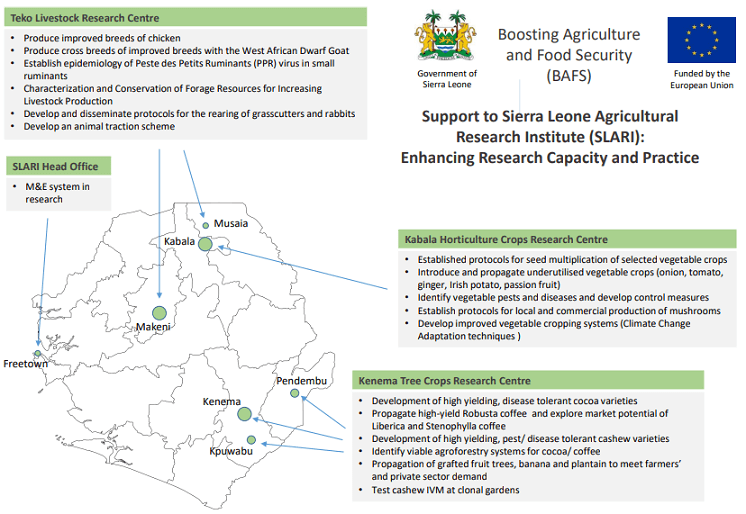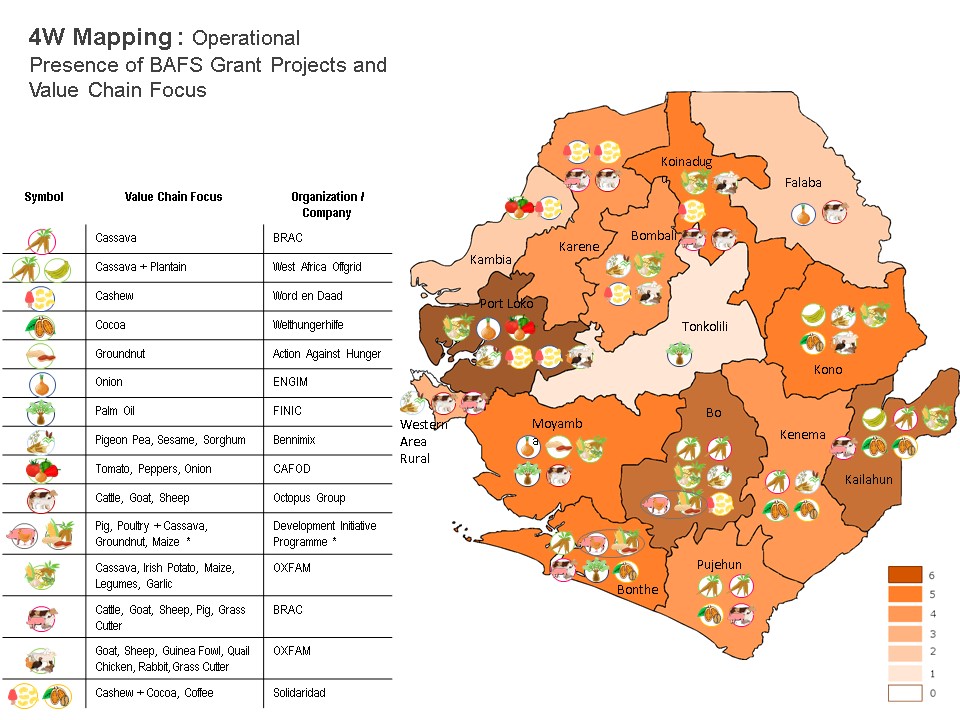Project Components
The BAFS project consist of three major components1.
Institutional Capacity Building of MAF
The first BAFS component aims at reinforcing MAF capabilities to foster better governance of the sector both at central and regional level.
As a Ministry, MAF has the role to coordinate the agricultural sector, enforce government strategies and priorities, and provide advisory services for farmers and farmer groups. BAFS is designed to strengthen capacities in the Ministry, especially with support for policy development, improvement of data management and analysis, and better coordination between the diverse agriculture and food security projects in the country.
Overall, BAFS also strengthens MAF human resource capacities (through specialized trainings) in the different component areas of the BAFS programme and for specific areas in the Ministry.
Capacity building and sector initiatives with MAF Divisions:
(click on the + next to the Division in order to see the information)
Agric Mechanization Division
- Conduct a comprehensive national soil survey
Crops Division
- Promotion of integrated pest management specifically in respect of the current outbreak of Fall Army Worm (FAW) infestation
Extension Division
- Elaboration and implementation of an ‘e-extension’ service delivery system
- Elaboration and integration of climate smart agriculture in the extension service delivery system
Overview_Map_CSA_support_to_MAF_v_Nov2020
Forestry Division
- Establishment of a pilot community-based forest management project and capacity building initiatives
Livestock and Veterinary Services Division
- Elaboration and design of a curriculum/curricula for the livestock sub-sector and veterinary science studies in Sierra Leone
- Provision of support for improved and increased livestock inspection, disease surveillance and movement controls on cross-border livestock trade at border crossings on Sierra Leone’s national borders with Guinea and Liberia
Planning, Evaluation, Monitoring and Statistics Division (PEMSD)
- Training of PEMSD staff in data collection and analysis
- Assist MAF to conduct crop yield assessments
- Development of a National Farmers’ Register
- Upgrade and transform the existing MAF MIS system into an Agricultural Information Management System
- Train PEMSD and other MAF staff in use of moisture meters for grains
- Conduct annual Actor Landscape Study and 4W Mapping (Who is Doing What, Where and When)
Cross Cutting Issues
- Policy Development for commodity and sector governance:
- Cocoa, Coffee, Cashew, Gender in Agriculture – Completed
- Integrated Pest Management (IPM) – Planned
- Development of comprehensive MAF Staff training plan and gaps assessment
- International networking, internal and external capacity building, training programmes for MAF staff and investment in training infrastructure
- Promotion of the DFS (digital financial services) for smallholder farmers concept through follow-up activities to the DFS ecosystem analysis
2.
Reaearch Capacity and Practice – Support to SLARI
BAFS provides funding and supportive supervision to three specialized research stations of SLARI: Kabala Horticulture Crops Research Centres (KHCRC), Teko Livestock Research Centre (TLRC), and Kenema Tree Crops Research Centre (KTCRC). Different research topics have been identified in a participatory process by MAF and SLARI management, national scientist and international experts.

3.
Open grants to NGO and Private sector
Through open tenders, BAFS engages the expertise and services of non-governmental organization and the private sector to implement projects in two broad areas:
- Agricultural crop and system diversification through the promotion of tree cops, horticulture and other crops, livestock
- Agribusiness and innovative farming to promote key commodities and upgrade value chains
There are currently 15 different initiatives which are implemented in partnership with MAF and other public and private sector institutions and covering all districts in Sierra Leone

Want to connect with us?
Follow us on
